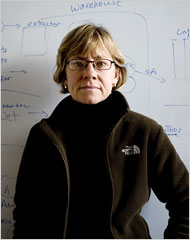 So how exactly is California faring with all of its climate change aspirations? Does the walk follow the talk? And if it doesn't, what does this mean for the rest of the country?
So how exactly is California faring with all of its climate change aspirations? Does the walk follow the talk? And if it doesn't, what does this mean for the rest of the country?Deb Niemeier, University of California, Davis
Tuesday, April 6th, 2010
Co-sponsored by CEMS
ROUNDTABLE DISCUSSION - Topic: Interdisciplinary Research Programs
10:00 am - Decision Theater, Farrell Hall
SEMINAR - Topic: Women in Engineering Leadership
1:30 pm - Perkins Building, Room 101
BURACK LECTURE - "Climate change and transportation: Lessons from California"
4:00 pm - Marsh Lounge, Billings Center
 So how exactly is California faring with all of its climate change aspirations? Does the walk follow the talk? And if it doesn't, what does this mean for the rest of the country?
So how exactly is California faring with all of its climate change aspirations? Does the walk follow the talk? And if it doesn't, what does this mean for the rest of the country?
In this talk, we'll travel through California's enabling legislation, from AB 32, which sets statewide greenhouse gas emissions (GHG) reduction targets to SB 375, which authorizes the setting of metropolitan area GHG emissions reduction targets. The state's legislative ambitions are without parallel and will demand more from the average Californian than most recognize. We'll look at how California's historical environmental progressiveness is faring within its current political actuality. We'll examine how communities are managing the initiatives and enumerate the ways in which the state might have to rethink its basic transportation strategies. As the various political groups begin to gear up for the next gubernatorial election, and with a faltering economy, things will only get more interesting.
Dr. Deb Niemeier is a Professor in the Dept. of Civil and Environmental Engineering at the University of California, Davis. Her research interests include transportation-air quality modeling, energy consumption and land use interactions, sustainability and the project development process for major infrastructure projects. Her current projects include among others, exploring a net-zero regional GHG emissions strategy for the Capay Valley in California, examining environmental justice issues in the development of state climate change legislation, and developing a sustainability indicator using market prices. Working with an interdisciplinary research group of graduate students, post-doctoral scholars, and faculty collaborators, she has published more than 110 journal articles and book chapters.
She has served as Dept. Chair and she recently served for four years as the Director of the John Muir Institute and Associate Vice Chancellor in the Office of Research at UC Davis. The Muir, which includes more than 100 active researchers, is a center of excellence for research and outreach programs related to the biological, physical, and human environment. She also served on the expert independent review teams to assess the cost increases associated with the San Francisco Bay Bridge and to review the cost methods used for the proposed 3rd locks of the Panama Canal. She is currently the Editor-in-Chief of Transportation Research, Part A and is a member of the MARs Corp. Scientific Advisory Council (Sustainability). She is a member of the graduate faculty in Computer Science, Ecology, Human and Community Development and Biological and Agricultural Engineering.